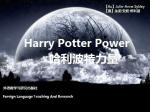Harry Potter Power.
Harry Potter Power
. Dr Julie-Anne Sykley. Glass House
Books. 2010. 268pp.
Harry Potter Power is a nonfiction about releasing people’s inner psychological power, written by Dr Julie-Anne Sykley. Known as an experienced psychologist, Dr Julie-Anne Sykley uses special plots and characters in Harry Potter to demonstrate relevant significant psychological theories and provide a lot of practical and workable methods to enhance our inner powers. The audience is expected to realize the existence and functions of our inner powers, thus making best of these powers to reduce negative emotions and increase happiness to lead a better life through reading. From my point of view, although each section isn’t concrete and detailed enough for the limitation of the width of content, the purpose of the book is basically achieved and it does make a difference on me.
The book truly fits with the social background, which proves its necessity and considerable realistic significance. As the process of urbanization speeds up and the pressure from life increases, it’s more likely to produce more negative emotions. Worse still, we don’t have enough time and right ways to efficiently pour those harmful out. As a consequence, more and more people, including the young and the senior, suffer from mental problems due to increasing life stress and poor emotional connections. At this time, Dr Julie-Anne Sykley writes the book to teach us how to correctly view tragedy in life, how to cope with bad moods, how to get comfort from animals and nature and finally how to keep a mentally healthy state, with the help of rich experience from twenty years’ mental health cause. The act is obviously worth respect and gratitude.
The structure of the book is explicit. The entire content consists of seven sections, the first of which tells the existence of our inner powers, and the following six parts respectively discuss the power of tragedy, thoughts, actions, animals, nature and love. Each section begins with a specific quotation from Harry Potter, which is a remarkable fiction around a boy entering a magic world. Then the author points out the similarity between the chosen plot and realistic life and put evidence to support it. For instance, “just as Dementors lower their hoods in Harry Potter’s world, depression lowers people’s moods, interest, energy and activity levels. Just as Dementors make people want to die, severe depression can also make people want to die or kill themselves.” At the end of each section, there would be practical tips to help us draw strength in our daily life.
The language feature of this book is serious yet lively. Apart from serious research statistics to support academic theories, the author also adopt a unique second-person mode with lively language, just as “ your thoughts have the poor to drag you under and drown you in deep despair, or else your thoughts can lift your mood and send you to the stars.”
Through reading, I also get some interesting feelings as follows.
Firstly, Dr Julie-Anne Sykley could find similarities between Harry Potter and reality, that is to say, classical masterpieces, just like Harry Potter, truly come from life and they can stand the test of interpretations from different points of view. Secondly, metaphor is a helpful skill to make an abstract concrete and approachable. For instance, the writer introduces a dish of swirling silver thoughts called a Pensieve in Harry Potter’s world to explain how thoughts work inside the human mind---sort and sift through information. Lastly, how we feel about a book is mostly based on our personal life experience. We all meet something, experience it, think about it and finally gain valuable personal ideas every day. These personal ideas are expected to be validated by others when communicating or reading. Fortunately, I find some in this book, just like “ an influential theory in psychology called ‘attachment theory’ argues that people are born to care and to seek care from others. If attachment needs are met, positive and healthy feelings of trust build up. But if natural needs are not met, negative and unhealthy feelings of mistrust emerge.”
Last but not least, the book may be viewed as chicken soup for the soul sometimes, but it does make a difference on my opinions and actions. I will learn to make changes to put myself in good mood when depressed. The book also gives me more courage to step out of my comfort zone to try something new, for reminding me that “Power is when opportunity knocks and you answer yes.”



 京公网安备 11010802032529号
京公网安备 11010802032529号